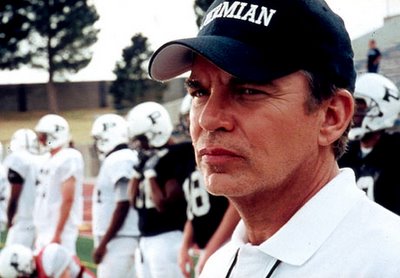
Billy Bob Thornton is cultivating a career marked by quirky but compelling firsts, from the sublime (Sling Blade, The Man Who Wasn't There) to the ridiculous (Bad Santa, of course). In Friday Night Lights (2004), directed by Peter Berg--an actor-turned director who seems to have done a good turn here, so to speak--he plays real-life Texas high school football coach Gary Gaines, and manages to deliver the oddest locker room pep talk in the history of movies, as far as I can tell. It begins by exhorting the team toward perfection, but is forgiving of the their shortcomings, almost eager to assure them winning doesn't matter, but only dignity and responsibility, and the capacity to love and carry each other in their hearts. Really. I will indulge and quote the speech as it appears on the Internet Movie Database:
"Being perfect is not about that scoreboard out there. It's not about winning. It's about you and your relationship with yourself, your family and your friends. Being perfect is about being able to look your friends in the eye and know that you didn't let them down because you told them the truth. And that truth is you did everything you could. There wasn't one more thing you could've done. Can you live in that moment as best you can, with clear eyes, and love in your heart, with joy in your heart? If you can do that, gentleman--you're perfect."
He goes on:
"I want you to take a moment, and I want you to look each other in the eyes. I want you to put each other in your hearts forever because forever is about to happen here in just a few minutes. I want you to close your eyes, and I want you to think about Boobie Miles, who is your brother [the star player who ruined his knee early on and had to sit out the season]. And he would die to be out there in that field with you tonight. And I want you to put that in your hearts. Boys, my heart is full. My heart is full."
"Live in that moment"? "My heart is full"? It is a remarkable episode in an otherwise straightforward film about The Only Game in Texas--which is a pretty clear accomplishment, to be an unadorned sports film that looks at most of the facets of this high-hopes, low-blow world without leaning too much either on the boys-to-men stuff or the cutthroat coaching parents angle. Those are in there, but mostly this movie wants to show us this world without telling us what to think.
Until we get to that speech. Berg shoots Thornton in closeup, that honest slab of a face itself in the moment, transcending all the cliches of every sports film, from the best (Hoosiers) to the worst (The Karate Kid?) until we feel he is talking to us, not his players, and exhorting us to fill our hearts with the joy of perfection. I tried out for football in high school, and was mercifully cut. But I was certain I could have held that joy in my own heart, regardless of my ability, because I knew--or wanted to know--the moment in which I could tell someone I had done everything I could, and had left nothing out. What a rare opportunity to shuffle off the embarrassed shrug, the rueful grin, and simplify one's life to a moment. And such a self-contained one: a silly game, silly enough to become a metaphor that can stand in for the real moments one has to face in adulthood.
And maybe better than a metaphor, but a myth, a story I could tell to explain myself to others as well as to me. I must admit I had forgotten why I had liked football as a kid--and not so much as a fan, collecting cards, cataloguing information. That seemed dull and lifeless. No, as bad as I was at it, I loved playing football with my friends. We were all about the same size, and owned pads and helmets--except Rob, rest his soul, who played without, a wiry muscle that slithered around our arms to escape, ball in hand--and for a while we played constantly, pretending we were on a team, suiting up and practicing every day, an older kid our self-appointed coach. Sitting in my seventh grade classroom, I was happy if it started to rain or snow, so we could play in the muck. It was, as I've said, pretend football played by a pretend football player, but I held an image in my heart of myself, not necessarily winning, but at least never giving up.
People assert that those who say winning isn't everything are the ones who usually lose. But when I listened to Thornton's speech, I realized that even if it were true, that losers console themselves with platitudes, that it's also true that seeking perfection is something you can hold in your hand, and actually do, like running, or throwing something, or tackling someone, or telling the truth.
No comments:
Post a Comment